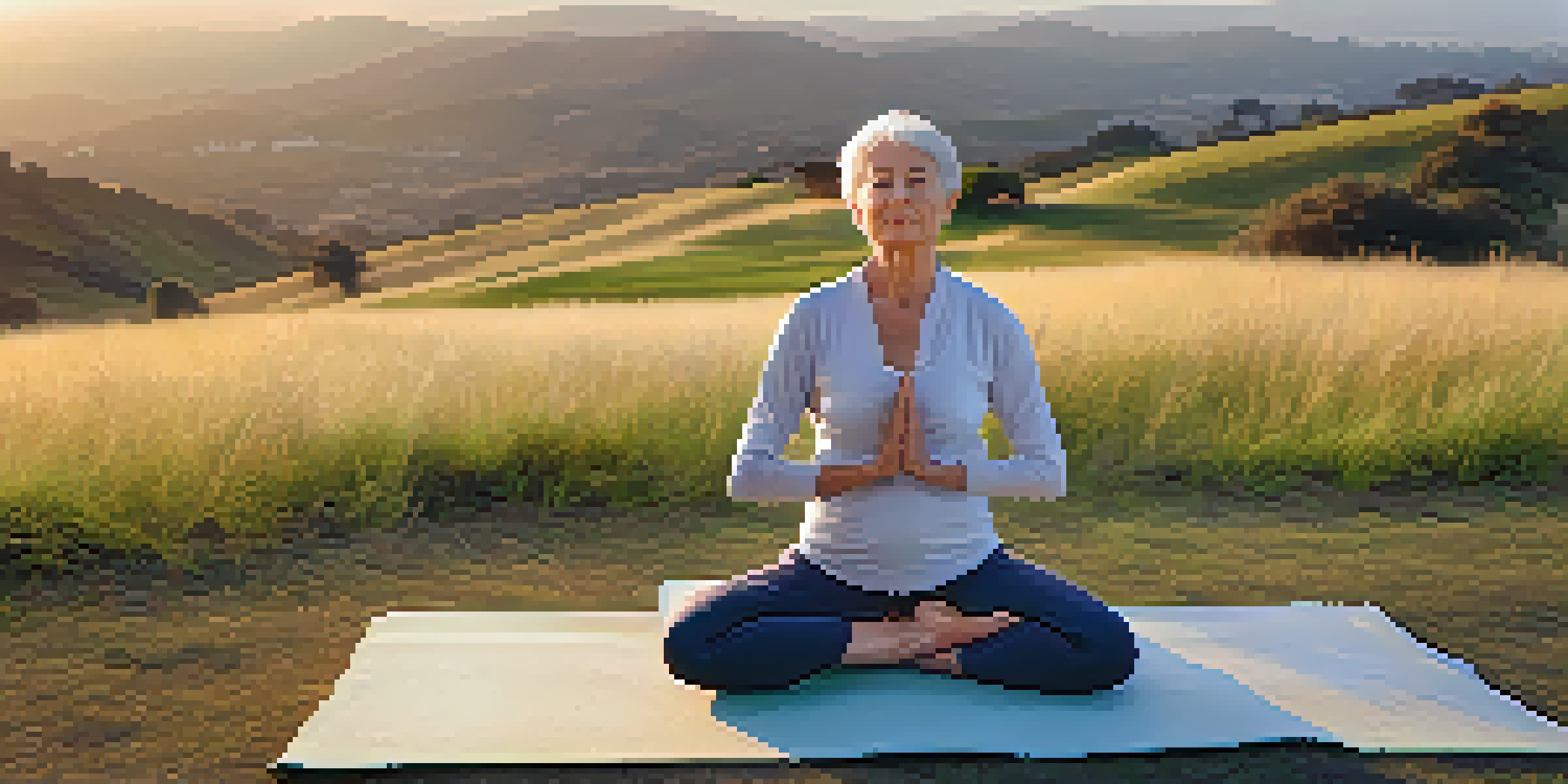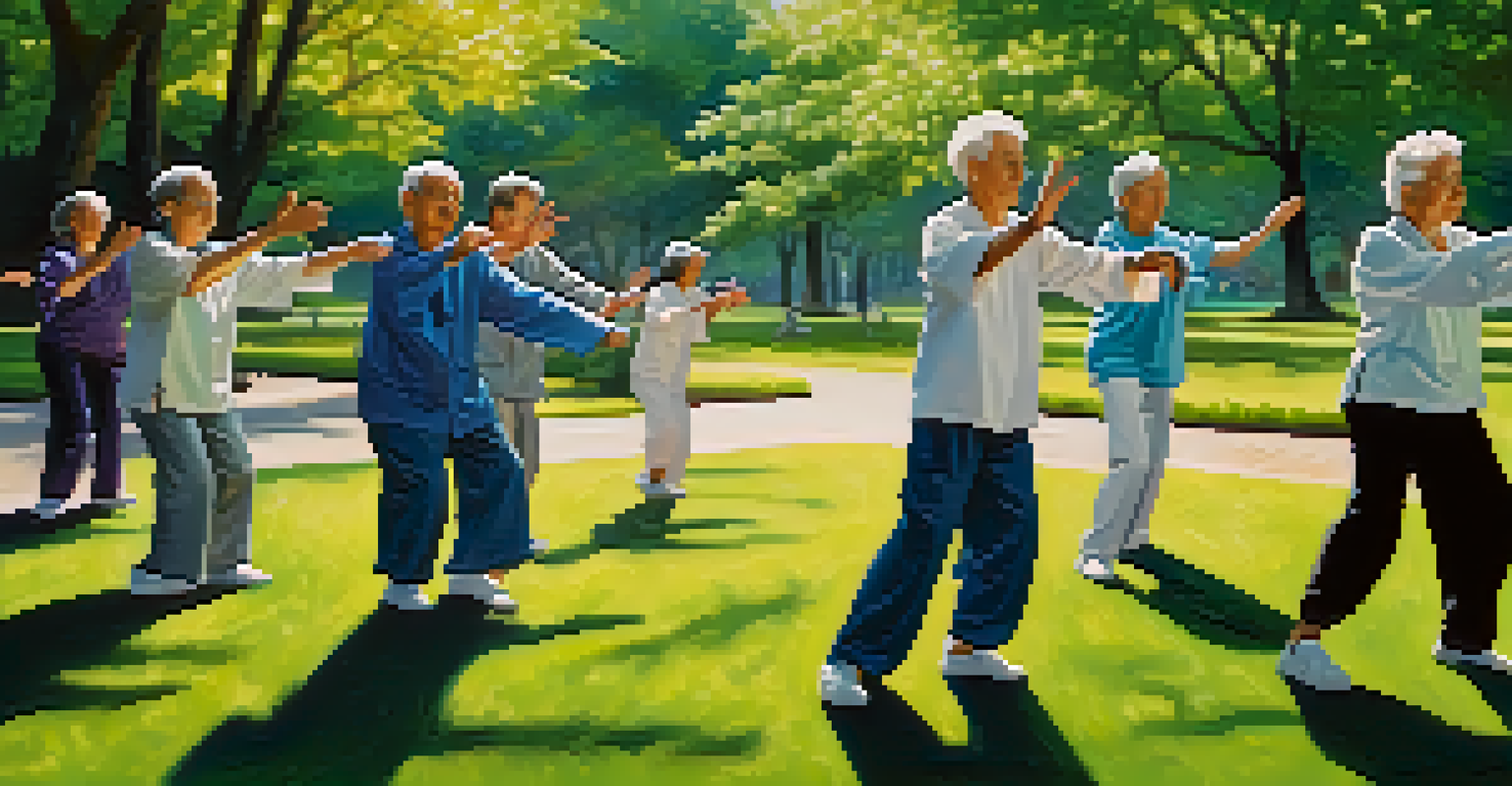Incorporating Mind-Body Practices for Healthy Aging

Understanding Mind-Body Practices and Aging
Mind-body practices encompass a variety of techniques that link mental and physical health. These practices, such as yoga, tai chi, and meditation, can contribute significantly to healthy aging. They help reduce stress, improve flexibility, and enhance overall emotional well-being.
The mind and body are not separate. what affects one, affects the other.
As we age, maintaining a balanced mind and body becomes crucial. Engaging in these practices not only helps to mitigate the physical effects of aging but also supports cognitive function, which is vital for maintaining independence. Think of it as a holistic approach to aging gracefully.
Incorporating these practices into your daily routine can create a foundation for a healthier, more vibrant life. By fostering this connection between mind and body, you can navigate the challenges of aging with more resilience and positivity.
The Benefits of Yoga for Seniors
Yoga is a fantastic mind-body practice that offers numerous benefits for seniors. It enhances flexibility, strength, and balance, which are vital for preventing falls—a common concern in older adults. Moreover, the mindful breathing techniques in yoga promote relaxation and reduce anxiety.

Many seniors find that yoga not only improves their physical health but also boosts their mental clarity. Through consistent practice, participants often notice increased focus and a greater sense of calm. It's like giving your mind a refreshing workout while strengthening your body.
Mind-Body Practices Enhance Aging
Engaging in techniques like yoga, Tai Chi, and meditation promotes physical health and cognitive function, supporting graceful aging.
Whether practiced in a class or at home, yoga can be adapted to any skill level. This flexibility makes it an accessible option for almost anyone, proving that you’re never too old to start your yoga journey.
Tai Chi: The Gentle Martial Art for Aging Gracefully
Tai Chi, often referred to as 'meditation in motion,' is an excellent practice for promoting balance and coordination in older adults. The slow, deliberate movements help improve muscle strength and flexibility while reducing stress. Imagine it as a flowing dance that nurtures both body and mind.
It is health that is real wealth and not pieces of gold and silver.
Research has shown that regular Tai Chi practice can significantly enhance balance, decreasing the risk of falls and injuries. It’s also been linked to improvements in mental health, including reduced symptoms of anxiety and depression. This makes Tai Chi a holistic remedy for both physical and emotional challenges.
Getting started with Tai Chi can be as simple as joining a local class or following along with online tutorials. The community aspect often found in Tai Chi groups also fosters social connections, which are essential for mental well-being as we age.
Meditation: Cultivating Peace of Mind
Meditation is a powerful tool for promoting mental clarity and emotional resilience. It encourages mindfulness, allowing individuals to focus on the present moment rather than worrying about the past or future. This practice can be particularly beneficial for seniors who may experience anxiety or stress related to aging.
Incorporating just a few minutes of meditation into your daily routine can lead to significant improvements in mental well-being. Many find that this practice helps them feel more centered and calm, much like hitting a reset button on their busy minds.
Yoga Boosts Flexibility and Focus
Yoga not only improves physical attributes like flexibility and strength but also enhances mental clarity, making it ideal for seniors.
There are various forms of meditation, from guided sessions to silent reflection. Finding a style that resonates with you can turn meditation into a cherished part of your day, contributing to a more peaceful and enjoyable aging experience.
Breathwork: Harnessing the Power of Your Breath
Breathwork involves intentional breathing techniques designed to enhance physical and emotional well-being. For seniors, breathwork can help reduce stress, improve lung capacity, and increase overall vitality. By focusing on your breath, you can create a sense of calm and clarity.
Simple exercises, such as deep belly breathing or the 4-7-8 technique, can be practiced anywhere and at any time. These techniques serve as a quick way to destress, much like a mini-vacation for your mind and body. The best part? They require no special equipment—just you and your breath.
Integrating breathwork into your daily routine can empower you to take control of your health. It’s an effective reminder that sometimes, all we need to do to feel better is to pause and take a deep breath.
The Role of Nutrition in Mind-Body Practices
Nutrition plays a vital role in supporting mind-body practices. A balanced diet rich in fruits, vegetables, whole grains, and lean proteins fuels your body and brain, enhancing your ability to engage in physical activities like yoga and Tai Chi. Think of food as the foundation for your well-being.
Certain foods, such as omega-3 fatty acids found in fish, can also support cognitive health, making them a smart addition to your diet as you age. Staying hydrated is equally important, as it helps maintain energy levels and cognitive function.
Nutrition Supports Mind-Body Health
A balanced diet rich in essential nutrients fuels the body and brain, reinforcing the benefits of mind-body practices for healthy aging.
By combining healthy eating with mind-body practices, you create a powerful synergy that promotes overall health. It’s not just about what you do; it’s also about what you put into your body to support your journey towards healthy aging.
Creating a Sustainable Mind-Body Routine
Establishing a sustainable routine for mind-body practices requires intention and commitment. Start by setting realistic goals that fit your lifestyle and preferences. Whether it’s 10 minutes of yoga each morning or a weekly Tai Chi class, consistency is key to reaping the benefits.
Incorporating variety can also keep your routine engaging. Mixing different practices, such as alternating between meditation and breathwork, can prevent boredom and motivate you to stay committed. It’s like a buffet of wellness options where you can sample what resonates with you.

Lastly, don’t hesitate to seek support from friends or community groups. Sharing your journey with others can provide encouragement and accountability as you explore the enriching world of mind-body practices for healthy aging.